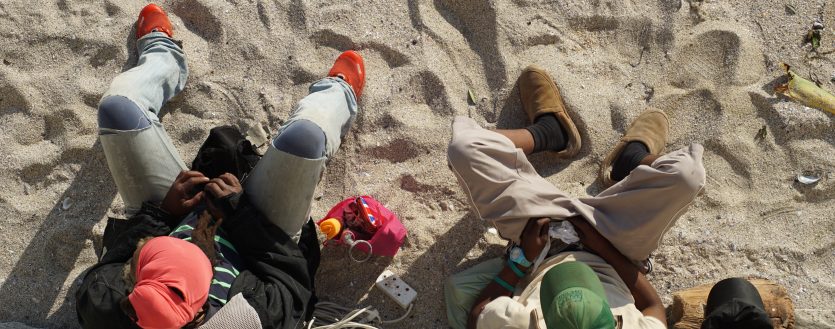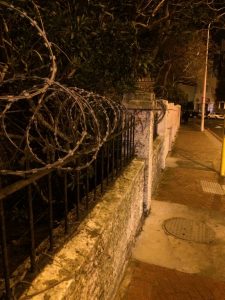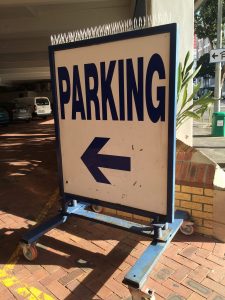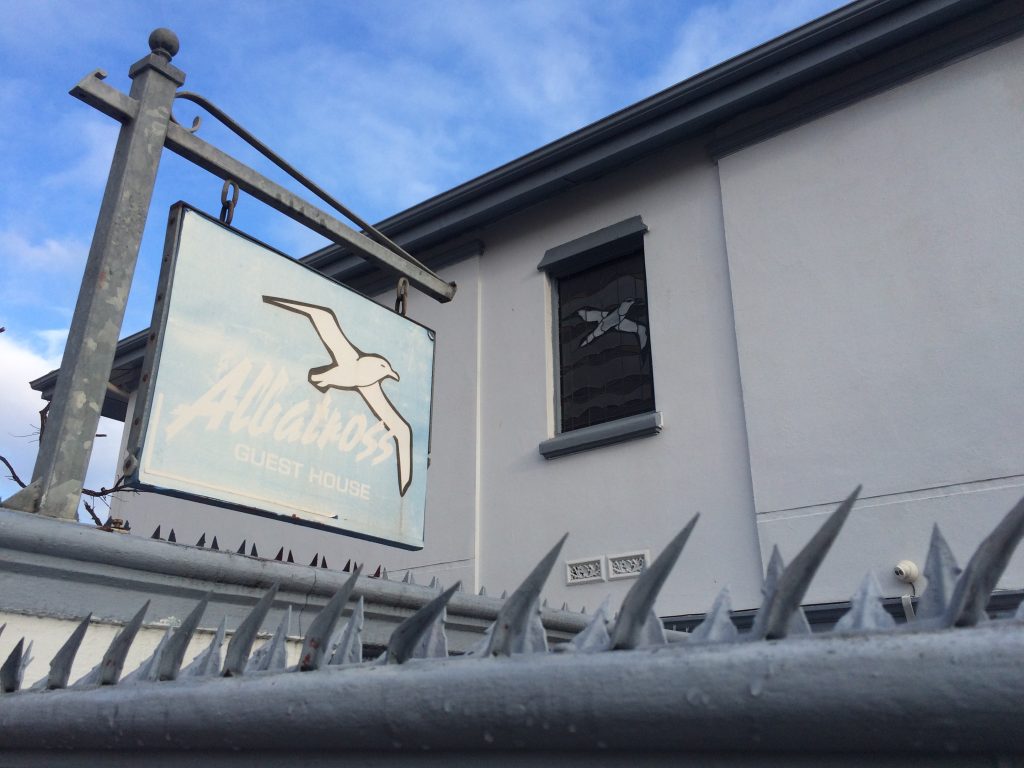
Safety or Paranoia?
Is South Africa safe? No, it’s not and here’s why.
Safety is both objective and subjective. Every major city has crime, and human nature is incredibly flawed. There’s danger in many places around the world. I’m from a small town of less than 2,000 people in the Midwest, but even there we’ve had a murder, suicide, and other small and medium sized crime.
When I enter a country, I’m on the border of paranoia when it comes to safety. My eyes move faster; I’m more alert, and I take in my surroundings like data into a computer to access whether or not my wallet and body are in any sort of danger. I feel like an impala walking into new lands on the plains of Africa, a bit nervous about what might lurking in the tall grass around me. Those reactions occur naturally now, probably because of some incidents that I’ve had traveling in the past, and also through other’s issues that I’ve learned about. My fears don’t overwhelm me and don’t inhibit my enjoyment of a new place, but they are definitely present and switch on during a new trip.
Relativity?
Sometimes I hear people make the argument that crime is relative and that each town or city has dangerous elements therefore it’s not possible to judge one to be more problematic than the other. That logic seems almost childlike in its simplicity. To say that Toyko or Iceland presents the same level of danger to tourists or for those people living there as Caracas or Johannesburg is like saying your average house cat and an African lion represent the same level of danger to someone. It’s just ludicrous.
Saying that South Africa isn’t safe is bound to stir up controversy with some people. What is the criteria for whether a country is safe or not? There isn’t one. Ask a few dozen backpackers, business people, upper class travelers, and vacationers and you’ll get a variety of answers. There are also danger from different angles such as from people, animals, and the environment, but my take revolves around safety as it relates to other people.
When asked about whether or not South Africa is safe, many people will say that Johannesburg is the bad spot. They’ll say that Cape Town is safe and that JoBerg is the problem city. JoBerg is a problem city yes, and is one of the most dangerous cities in the world, but outside of JoBerg there’s also a lot of crime. Cape Town has one of the highest murder rates in the world, and double that of Johannesburg. And what about Durban? Is Durban really that safe? No it’s not. Durban and JoBerg’s downtown areas are seedy even during the day, and essentially off limits at night. And if you happened to be caucasian, well night time in those cities means one thing…bed time.
Robbed
In a recent month long trip in South Africa I met a dozens of local people and travelers and tried to ask as many as I could what they thought about safety in South Africa. They gave various answers and explanations, but I asked each person if they had ever been robbed. I would estimate that 80%-90% of everyone said that they had been robbed at some point. That said it’s still very possible to vacation here and barely notice any safety issues. If you stay in the V & A Waterfront area in Cape Town in a nice hotel, get taxis, private transport or tours to places, go out to wineries, and ignore other places like JoBerg and Durban – well you’re touring in sort of a safety cocoon, or bubble. That’s just fine, but cocoon traveling separates reality from poster material, that type of tourism is skewing a person’s overall experience.
Why South Africa Isn’t Safe
1. You can’t wear what you want and travel freely. For example, if you have an iPhone that is a major attractant for criminals. Holding up and iPhone to take photos is like waving newly purchased jewelry around. A decent watch or purse draws lots of attention too.
2. It is NOT safe to be out walking at night in Johannesburg and Durban. Cape Town is mostly safe, but the beach areas are not and Long Street in the downtown (CBD) area isn’t great either. At least there are lots of people there for to somewhat defuse the danger. Solo female travelers need to be extremely cautious in South Africa especially in Durban and Johannesburg. I arrived at my hostel in a nice part of Cape Town one night at the exact same time that a girl from NY exited a taxi. After being buzzed into the hostel gate, she told everyone inside the hostel that she had just been robbed at knife point near the bus station downtown waiting for her Uber ride.
3. Pubic transportation in South Africa is not safe. If you tell a local that you plan to travel by bus or train they will either ask why and tell you not to do so, or say that you’re you’re crazy. No honest person can say that public transportation in South Africa is safe.
4. Locals don’t feel especially safe in their own country too. I noticed men working at gas stations pumping gas at 6 am laughing and talking with each other but constantly scanning people passing by and around the station. People routinely run ‘robots’ or red lights in the late evenings in South Africa, because staying parked until a green light appears makes car jacking much easier. Look at people walking around any part of Johannesburg at any hour and you’ll see one thing in common: fear.
5. There are plenty of homeless and drugged up people in South Africa. This isn’t as much of a concern for me as other factors listed here, as poverty doesn’t equate to crime. Crime is a values issue not an economic one. But seeing people sleep outside on the grass outside of the Joberg airport or shoot up drugs on the beach in Cape Town (main photo in this post) isn’t comforting either.
6. Unemployment is high in nearly every country in Africa, and South Africa’s unemployment rate is nearly 30%. That means that there are lots of people standing around doing nothing and possibly looking to do bad things. When you walk by someone and they stare at your watch as you pass by rather than make eye contact that’s not a good sign.
7. South Africa is the 6th wealthiest country in Africa in terms of its GDP per capita. However in terms of murder rates, assaults with intent to do grievous bodily harm, house robberies, hijackings and vehicle theft, and non-residential robbery, its standing is poor. I met people at random who had been car jacked (while they were inside or just leaving the vehicle), robbed at knife or gun point, had their houses broken into, and much more. I didn’t seek out these individuals, they were just everyday people that I ran into during my trip.
8. Other travelers experiences vary dramatically. It’s very possible you can go to South Africa, stay a hotel in Cape Town, bypass JoBerg on your way to a safari and think that the country doesn’t have any safety issues at all. But if you spend time there, walk around a lot, and actually participate in normal life there and not just top shelf tourist activities, then you probably get a much different vibe. I met a group of college age backpackers hiking on Table Mountain during my final few days in Cape Town. We made small talk and they said that they had only been in the country for four days. I joked asked if they had been robbed yet, and to my surprise one of them said yes, he had – at knifepoint. After being out in Capetown dancing and drinking, he was outside a bar and pretty drunk. He was looking to get a taxi and some girls asked him to share a taxi van with them, so he gladly did! The driver took him to his hostel, and as he exited the van the driver walked over to him, shoved him up against the van, held a knife to his throat, and said that if he didn’t give him 1000 Rand (a little less than $100 US), that he would kill him. The young man walked into his hostel, and explained the situation to the night watchman working there who looked at him squarely and said “go and pay him, he knows where you live now”. So he went up, got some money and walked out and paid the guy.
9. Local people tell me that there is police corruption and bribery in South Africa. If you get pulled over a traffic ticket, sometimes cash can get you out of a situation. Corruption is entry level evil for a population.
10 There is razor and barbed wire, broken glass and alarm systems on nearly every home (in nice areas because the poor can’t afford those protections). Seeing the amount of intruder safeguards in South Africa rivals only that in Sao Paulo, Brazil.
(Above) Common theme for housing in South Africa, sharp objects around any area thieves can break in through. (Below) Razor wire guarding a residence on Long Street in downtown Cape Town, and a parking sign at downtown hospital with metal spears on top of it.


Conclusion
There are many parts of touring South Africa that feel just like anywhere else in the world. Walking and touring during the day brings up few safety issues for where most tourists are likely to venture. But in South Africa, tourists really have to be wary of your surroundings. I think it’s also important to visit at least one township during a visit to any city in South Africa. Most people in the country live in townships (poor areas – often metal or wood shacks crammed together) and seeing how the majority of citizens live is worthwhile. If you do tour a township, make sure to have a guide and avoid going on your own (or even with your own group of friends).
South Africa is one of the most beautiful countries that I’ve visited. It’s national parks, wildlife areas, coastal drives, mountains, wine regions and more are just spectacular. However it’s important to know that South Africa has a variety of safety challenges for tourist too.

